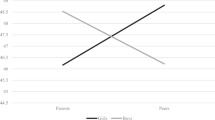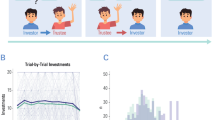Abstract
Four hundred and thirty-four children enrolled in school years 5 and 6 in the United Kingdom were administered measures of trust beliefs in peers/best friends and psychosocial functioning (internalized maladjustment, self-perceived social acceptance, social preference, and social exclusion) across an 8-month period (mean age = 9 years − 9 months at Time 1). The relation between children's trust beliefs in peers or trust beliefs within best friend dyads and measures of psychosocial functioning conformed to a quadratic pattern. Compared to children in the middle range of trust beliefs, children with very low trust beliefs and those with very high trust beliefs in peers and/or within best friend dyads displayed higher internalized maladjustment, lower self-perceived social acceptance, higher social exclusion, and lower social preference. The relation between the trust beliefs and internalized maladjustment was asymmetrical, with children who held very low trust beliefs being comparatively more disadvantaged.
Similar content being viewed by others
References
Asher, S., Hymel, S., & Renshaw, P. (1984). Loneliness in children. Child Development, 55, 1456–1464.
Bernath, M. S., & Feshbach, N. D. (1995). Children's trust: Theory, assessment, development, and research directions. Applied and Preventive Psychology, 4, 1–19.
Berndt, T. J. (1979). Developmental changes in conformity to peers and parents. Developmental Psychology, 15, 608–616.
Bridges, L. J. (2003). Trust, attachment, and relatedness. In Marc H. Bornstein, & Lucy Davidson (Eds.) Well-being: Positive development across the life course. Crosscurrents in contemporary psychology (pp. 177–189). Mahwah, NJ: Lawrence Erlbaum Associates.
Bukowski, W. M., & Hoza, B. (1989). Popularity and friendship: Issues in theory, measurement and outcome. In T. J. Berndt, & G. W. Ladd (Eds.), Peer relationships in child development (pp. 15–45). New York: Wiley.
Buhrmester, D., & Furman, W. (1987). The development of companionship and intimacy. Child Development, 58, 1101–1113.
Buzzelli, C. A. (1988). The development of trust in children's relations with peers. Child Study Journal, 18, 33–46.
Carter, A. S., Briggs-Gowan, M. J., Jones, S. M., & Little, T. D. (2003). The Infant-Toddler Social and Emotional Assessment (ITSEA): Factor structure, reliability, and validity. Journal of Abnormal Child Psychology, 31, 495–514.
Cohen, J., Cohen, P., West, S. G., & Aiken, L. S. (2003). Applied multiple regression/correlation analysis for the behavioral sciences (3rd ed). Mahwah, NJ: Lawrence Erlbaum Associates.
Coie, J. D., Dodge, K. A., & Coppotelli, H. (1982). Dimensions and types of social status: A cross-age perspective. Developmental Psychology, 18, 557–570.
Cowie, H., & Sharp, S. (1996). Peer counselling in schools. London: Fulton.
Erikson, E. H. (1963). Childhood and society (2nd ed.). New York: Norton.
Harter, S. (1985). Manual for the self-perception profile for children. Denver, CO: University of Denver Press.
Hartup, W. W. (1996). The company they keep: Friendships and their developmental significance. Child Development, 67, 1–13.
Howe, N., Aquan-Assee, J., Bukowski, W. M., Lehoux, P. M., & Rinaldi, C. (2001). Siblings as confidants: Emotional understanding, relationship warmth, and sibling self-disclosure. Social Development, 10, 439–454.
Imber, S. C. (1973). Relationship of trust to academic performance. Journal of Personality and Social Psychology, 28, 145–150.
Johnson-George, C., & Swap, W. C. (1982). Measurement of specific interpersonal trust: Construction and validation of a scale to assess trust in a specific other. Journal of Personality and Social Psychology, 43, 1306–1317.
Kenny, D. (1995). The effects of noninterdependence on significance testing in dyadic research. Personal Relationships, 2, 67–75.
Killen, M., & Stangor, C. (2001). Children's social reasoning about inclusion and exclusion in gender and race peer group contexts. Child Development, 72, 174–186.
Koenig, L. J., & Abrams, R. F. (1999). Adolescent loneliness and adjustment: A focus on gender differences. In K. J. Rotenberg & S. Hymel (Eds.) Loneliness in childhood and adolescence (pp. 296–322). New York: Cambridge University Press.
Kovacs, M. (1992). The Children's Depression Inventory Manual. New York: Multi Health Systems.
Lemerise, E. A. (1997). Patterns of peer acceptance, social status, and social reputation in mixed-age preschool and primary classrooms. Merrill-Palmer Quarterly, 43, 199–218.
Lester, D., & Gatto, J. (1990). Interpersonal trust, depression, and suicidal ideation in teenagers. Psychological Reports, 67, 786.
Nolen-Hoeksema, S., & Girgus, J. S. (1994). Emergence of gender differences in depression during adolescence. Psychological Bulletin, 115, 424–443.
Newcomb, A. F., & Bagwell, C. L. (1995). Children's friendship relations: A meta-analytic review. Psychological Bulletin, 117, 306–347.
Park, K. A., Lay, K., & Ramsay, L. (1993). Individual differences and developmental changes in preschooler's friendships. Developmental Psychology, 29, 264–270.
Park, K. A., & Waters, E. (1989). Security of attachment and preschool friendships. Child Development, 60, 1076–1081.
Parker, J. G., & Asher, S. R. (1987). Peer relations and later personal adjustment: Are low accepted children “at risk?” Psychological Bulletin, 102, 357–389.
Parker, J. G., & Asher, S. R. (1993). Friendship and friendship quality in middle childhood: Links with peer group acceptance and feelings of loneliness and social dissatisfaction. Developmental Psychology, 29, 611–621.
Parker, J. G., Rubin, K. H., Price, J. M., & DeRosier, M. E. (1995). Peer relationships, child development, and adjustment: A developmental pathology perspective. In. D. Cicchetti and D. Cohen (Eds.), Developmental Psychopathology Vol.2: Risk, disorder and adaptation (pp. 96–161). New York: Wiley.
Reynolds, C. R., & Richmond, B. O. (1997). What I think and feel: A revised measure of children's manifest anxiety. Journal of Abnormal Child Psychology, 6, 271–280.
Rotenberg, K. J. (1986). Same-sex patterns and sex differences in the trust basis of children's friendship. Sex Roles, 15, 613–626.
Rotenberg, K. J. (1994). Loneliness and interpersonal trust. Journal of Social and Clinical Psychology, 13, 152–173.
Rotenberg, K. J. (2001). Trust across the life-span. In N. J. Smelser & P. B. Bates (Eds.). International Encyclopedia of the Social and Behavioral Sciences (pp. 7866–7868). New York: Pergamon.
Rotenberg, K. J., Fox, C., Green, S., Ruderman, L., Slater, K., Stevens, K., & Carlo, G. (2005). Construction and validation of a children's interpersonal trust belief scale. British Journal of Developmental Psychology, 23, 271–292.
Rotenberg, K. J., MacDonald, K. J., & King, E. V. (2004). The relation between loneliness and interpersonal trust during middle childhood. Journal of Genetic Psychology, 165, 233–249.
Rotenberg, K. J., McDougall, P., Boulton, M. J., Vallancourt, T., Fox, C., & Hymel, S. (2004). Cross sectional relations among trustworthiness, social relationships, and psychological adjustment in children and early adolescents from the United Kingdom and Canada. Journal of Experimental Child Psychology, 88, 46–67.
Rotter, J. B. (1980). Interpersonal trust, trustworthiness and gullibility. American Psychologist, 35, 1–7.
Taylor, G. (1996). Creating a circle of friends: A case study. In H. Cowie & S. Sharp (Eds.), Peer counselling in schools (pp. 73–86). London: Fulton.
Vaughn, B. E., Tameka, N., Colvin, M. R., Azria, L. C., & Krzysik, L. (2001). Dyadic analyses of friendship in a sample of preschool-age children attending Head Start: Correspondence between measures and implications for social competence. Child Development, 72, 862–878.
Wainryb, C., Shaw, L. A., & Maianu, C. (1998). Tolerance and intolerance: Children's and adolescents' judgments of dissenting beliefs, speech, persons and conduct. Child Development, 69, 1541–1555.
Wentzel, K. R. (1991). Relations between social competence and academic achievement in early adolescence. Child Development, 62, 1066–1078.
Wright, T. L., & Kirmani, A. (1977). Interpersonal trust, trustworthiness, and shoplifting in high school. Psychological Reports, 41, 1165–1166.
Author information
Authors and Affiliations
Corresponding author
Rights and permissions
About this article
Cite this article
Rotenberg, K.J., Boulton, M.J. & Fox, C.L. Cross-Sectional and Longitudinal Relations Among Children's Trust Beliefs, Psychological Maladjustment and Social Relationships: Are Very High as Well as Very Low Trusting Children at Risk?. J Abnorm Child Psychol 33, 595–610 (2005). https://doi.org/10.1007/s10802-005-6740-9
Received:
Revised:
Accepted:
Issue Date:
DOI: https://doi.org/10.1007/s10802-005-6740-9




